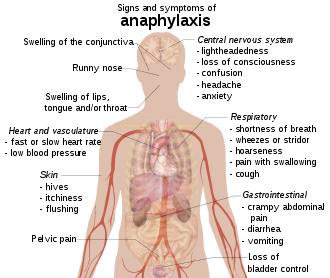Which of the following are clinical manifestations of anaphylaxis? select all that apply
Hypertension
Angioedema
Petechiae
Bronchospasm
Correct Answer : B,D
A. Hypertension: Anaphylaxis often leads to a rapid drop in blood pressure (hypotension) rather than hypertension. Hypotension is a more common symptom because of the severe vasodilation that occurs during anaphylactic reactions.
B. Angioedema: Yes, angioedema is a common clinical manifestation of anaphylaxis. Angioedema involves swelling of the deeper layers of the skin, often around the eyes and lips. It can also affect the throat, which can be life-threatening due to airway obstruction.
C. Petechiae: Petechiae are small red or purple spots that appear on the skin and are caused by bleeding into the skin's tissues. They are not a typical manifestation of anaphylaxis.
D. Bronchospasm: Yes, bronchospasm is a hallmark clinical manifestation of anaphylaxis. It involves the sudden constriction of the airways, leading to difficulty in breathing and wheezing.

Nursing Test Bank
Naxlex Comprehensive Predictor Exams
Related Questions
Correct Answer is C
Explanation
A. 8:00 AM: This time is too early to draw a trough level for a medication administered at 10:00 AM. The trough level should be drawn just before the next dose is given to get the lowest concentration in the bloodstream.
B. 11:00 AM: This time is after the scheduled dose of vancomycin at 10:00 AM. Waiting until 11:00 AM would not provide an accurate trough level because the patient has already received the medication.
C. 9:00 AM: This is the correct time to obtain the patient's blood sample. It is one hour before the scheduled dose of vancomycin at 10:00 AM. Drawing the trough level at this time ensures it reflects the lowest concentration of the drug in the bloodstream.
D. 12:00 noon: This time is after the scheduled dose of vancomycin at 10:00 AM. Waiting until noon would not provide an accurate trough level because the patient has already received the medication.
Correct Answer is ["A","B","C","D"]
Explanation
A. Viral Latency: Some viruses, like herpesviruses, can enter a latent phase where they hide in host cells, making it challenging for the immune system to detect and target them.
B. Host Defense Failure: This term encompasses situations where the host's defense mechanisms, including physical barriers and immune responses, are not effective in preventing or controlling infection. For example, pathogens may develop mechanisms to evade detection by the immune system.
C. Immunosuppression: Pathogens can actively suppress the host's immune response. They may produce molecules or proteins that inhibit the immune system's ability to mount an effective defense.
D. Immunodeficiency: Individuals with immunodeficiency disorders have weakened immune systems, which can be congenital (genetic) or acquired. This weakness makes them more susceptible to infections.

Whether you are a student looking to ace your exams or a practicing nurse seeking to enhance your expertise , our nursing education contents will empower you with the confidence and competence to make a difference in the lives of patients and become a respected leader in the healthcare field.
Visit Naxlex, invest in your future and unlock endless possibilities with our unparalleled nursing education contents today
Report Wrong Answer on the Current Question
Do you disagree with the answer? If yes, what is your expected answer? Explain.
Kindly be descriptive with the issue you are facing.
